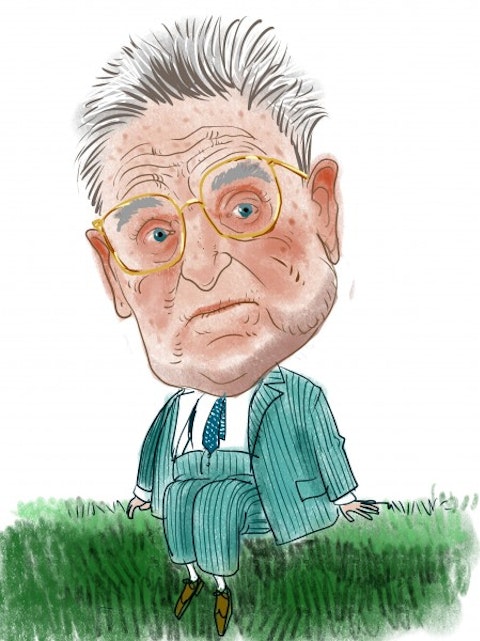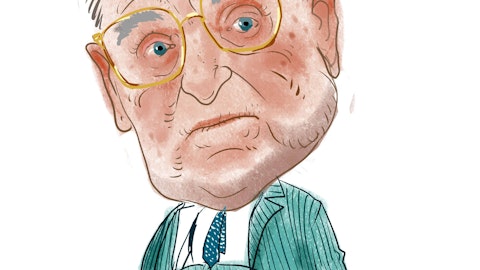Dwight Anderson, the founder of Ospraie Management, is a New-York based financial advisory firm that manages close to $2 billion in assets under management. Anderson’s fund has a variety of investment strategies, and has been known to place big bets on the commodity markets that occasionally have turned sour. Ospraie lost close to $1 billion in the most recent financial crisis due to ill-timed bets in commodities, but has since bounced back, and while we can’t track the fund’s entire portfolio, we can see that its 13F investments returned 1.1% last quarter. Here’s a complete look at Ospraie Management’s 13F portfolio; it contains about $240 million worth of equity investments.
Accounting for over 40% of his reported holdings, Adecoagro SA (NYSE:AGRO) easily takes the top spot in Anderson’s 13F portfolio. A position worth an estimated $100 million, Adecoagro is a South American agricultural company with most of its reach in Brazil, Argentina, and Uruguay. George Soros also holds a $232 million stake in the company, as Adecoagro is the infamous hedge fund manager’s second favorite stock. Check out all of George Soros’s stock picks here.
The company has been a solid investment since the start of 2012, returning a shave over 12%. This double-digit appreciation is far above the farm products industry, which has stayed relatively flat. Two of Adecoagro’s most well-known peers include Archer Daniels Midland Company (NYSE:ADM) and Bunge Limited (NYSE:BG), which have returned -1.8% and 20.9% respectively.
From an earnings standpoint, Adecoagro has been middle-of-the-road, generating EPS of 48 cents last year after being in the red in 2009 and 2010. In its most recent earnings release this past August, the company neither impressed nor disappointed, and placed a lot of emphasis on next year’s weather being crucial for its success. CEO Mariano Bosch stated that management doesn’t “have a clear view” on if South America will experience El Nino or La Nina, but that a similar drought that occurred this summer is obviously not desirable.
As stated in the conference call, EBITDA gains from higher commodity prices were almost 100% wiped out by “lower crop yields as a result of the summer drought.” Moreover, double-digit growth in the company’s milk production was effectively cancelled out by a shoddy rice segment. Rice EBITDA was in the red by $1.2 million, as lower than expected prices and an unstable Argentinian climate were to blame.
By the end of this fiscal year, expectations are that the company will reach a bottom line of 64 cents before normalizing to a 9.0% growth rate over the next half decade. While estimates are never certain, it is notable that Adecoagro’s analysts are nearly as bullish on the company’s EPS outlook as Archer Daniels (9.9%), Bunge (10.0%), and The Andersons, Inc. (NASDAQ:ANDE) at 13.5%, and are much more optimistic than those covering primary regional peer Cosan Limited (NYSE:CZZ).
When this expected growth is factored into the equation, we can see that Adecoagro does not look like a great value at the moment, as it trades at a PEG ratio above 2.0. This is above Archer Daniels (1.5), Bunge (1.4), Andersons (0.7), and Cosan (0.4), and similar “overvaluation” warning lights flash when we take a look at traditional P/E metrics. Adecoagro currently trades at an earnings multiple of 77.4, which is nearly double the valuation it had twelve months ago. In comparison to its aforementioned competitors, a similar premium can be seen.
On average, Adecoagro’s earnings are trading at a 490% premium to its primary peers. Despite growing its hoard of operating cash to $78 million after being cash flow negative just three years earlier, the company is also overvalued, as it sports a cash flow multiple of 14.3X, far above the industry’s average of 8.4X.
Adecoagro is a popular macro-event play, and those expecting inflation to hit the U.S. in the future could buy in. Perhaps this directional bet, along with the fact that the company is generating improved earnings growth are two of the reasons why Soros and Anderson are so bullish. Shares aren’t trading at the most attractive valuation, but any period of rising prices – whether they’re “hyper” or not – can push land-owning companies like Adecoagro to an even richer valuation.






